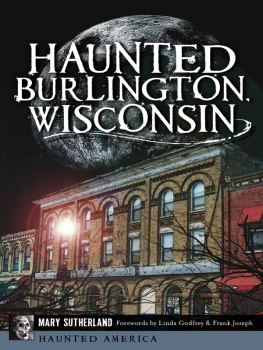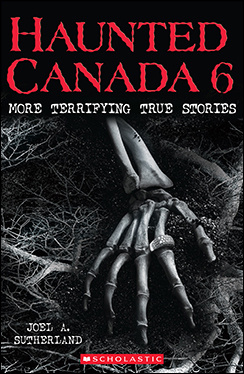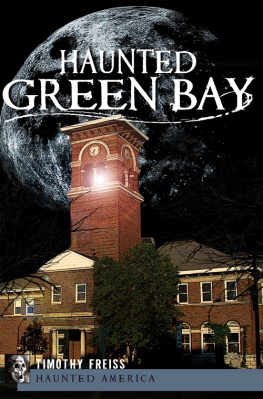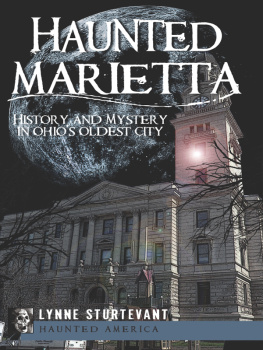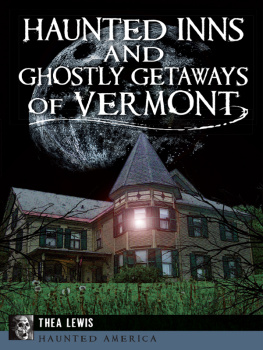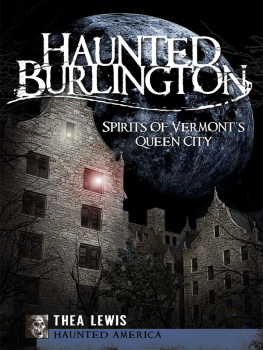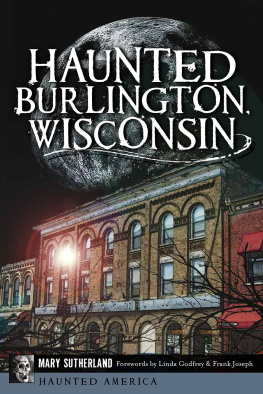
By stepping outside the box and believingnot in what society tells you, but your heartyou become the hero of your own journey.
Mary Sutherland
Acknowledgement
A special thank-you to all my family and friends who have followed me on my journey investigating the mysteries of Burlington.
Published by Haunted America
A Division of The History Press
Charleston, SC 29403
www.historypress.net
Copyright 2014 by Mary Sutherland
All rights reserved
All images are courtesy of the author.
First published 2014
e-book edition 2014
ISBN 978.1.62584.814.7
Library of Congress CIP data applied for.
print edition ISBN 978.1.62619.321.5
Notice: The information in this book is true and complete to the best of our knowledge. It is offered without guarantee on the part of the author or The History Press. The author and The History Press disclaim all liability in connection with the use of this book.
All rights reserved. No part of this book may be reproduced or transmitted in any form whatsoever without prior written permission from the publisher except in the case of brief quotations embodied in critical articles and reviews.
CONTENTS
DEDICATION
Genetic memory is invoked to explain the racial memory postulated by Carl Jung. In Jungian psychology, racial memories are posited memories, feelings and ideas inherited from our ancestors as part of a collective unconscious.
This book is dedicated to my great-great-grandmother Nanyehi, known in English as Nancy Ward, the last Beloved Woman of the Cherokees. I truly believe it is from my cell memories and the blood that connects us two that I gravitate toward the traditions and beliefs of my ancient ancestors. The ancient countries of the region lie between southern Appalachia and Arkansas. Here are found mounds, inscribed tablets, sculptures, sacred pipes and shell ornaments. This is the home of the ancient temples and mound builders, the Etowah, Adena and Cahokia. The land and DNA are my links to the Cherokee tradition of the Beloved Woman, or War Woman (Ghigua), Nanyehi.
Nanyehi is the most famous of the Cherokee Beloved Women, whose roles were the highest Cherokee women could aspire to. The title Ghigua Nanyehi earned while leading her people, after her husband was mortally wounded, to victory during a battle against the Creeks.
In her role as Beloved Woman, Nanyehi performed such duties as sitting in General Council (where she had full voice and voting power), heading the Womens Council, preparing the Black Drink for the Green Corn Ceremony and acting as a negotiator in treaty parlays. It is noted that in meeting with John Sevier to strike peace terms with the Americans at Little Pigeon River, Tennessee, in 1781, she was appalled that he had brought no female negotiators. He was equally appalled that she was trusted with such an important task. It has been recorded that she sent him back to his people stating her terms: Let your women hear our words.
Nanyehi is credited for stopping Toquas warriors from burning Lydia Bean at the stake. Bean, the wife of Tennessees first permanent settler, was forced to stay at the home of Nanyehi before returning to Watauga. Taking advantage of Beans stay, Nanyehi learned the art of making butter and cheese, subsequently purchasing cattle and introducing dairying to the Cherokee people.
She participated in several treaty negotiations and even spoke at the Treaty of Hopewell in 1785, when she made a dramatic plea for continued peace. At the close of the ceremonies, she invited the commissioners to smoke her pipe of peace and friendship. Nanyehi looked to the protection of Congress to prevent future disturbances and expressed the hope that the chain of friendship [would] never be broken. Although the commissioners promised that all settlers would leave Cherokee lands within six months, the whites ignored the treaty, which forced the Cherokee to make additional land cessions.
During the 1790s, Nanyehi observed enormous changes taking place within the Cherokee Nation. Her people adopted the commercial agricultural lifestyle of the nearby settlers and pressed for a republican form of government. Unlike the old system of clan and tribal loyalty, the new Cherokee government provided no place for a Beloved Woman, thus leaving Nanyehi, or Nancy Ward, the last of the Beloved Women.
Nancy Ward was born in 1738 at Chota, the sacred Mother Town of the Cherokee. The name of her father is not known because the Cherokee society was matrilineal so lineage was only tracked through the female line. Nanyehis mother was Tame Doe of the Wolf Clan, the sister of Attakullakulla, civil chief of the Cherokee Nation.
The Hiwassee Purchase of 1819 forced Nanyehi to abandon Chota. She moved south and settled on the Ocoee River near present-day Benton. There she operated an inn on the Federal Road until her death in 1822.
She was baptized on July 13, 1940, and endowed into the Mormon Salt Lake Temple on November 12, 1940. Of interest to me was the July 13 date; my birthdate is also July 13.
According to the president of the Nancy Ward Society, Nanyehi had three children: two by her first Cherokee husband (Tsu-la, or Kingfisher) and a daughter by her second husband, Bryan Ward. Their daughter, Elizabeth, was born in 1759 at the Cherokee Nation, now Tennessee. Ward deserted the two and returned to South Carolina to live with his white family. Elizabeth later went on to marry and have children by Joseph Martin, who was the son of Joseph Martin and Susannah Childs. It was through the Childs/Nanyehi blood that I inherited the Nanyehi lineage.
As the story goes, General Joseph Martin, from Virginia, was appointed the Indian agent to the Cherokee. Having much in common with Bryan Ward, Joseph and Bryan became close friends. On one of Martins trips into upper South Carolina, he met Nancy Ward and her daughter Elizabeth. He was entranced by Elizabeths beauty and asked for her hand in marriage, which was granted. He and Elizabeth purchased land adjacent to Bryan Ward, settling on the west branch of the Toogaloo River in Northeast Georgia, an area that later became Franklin County.
Not much is known about the history, but I was able to find the following reference to hard times during 1782 from an excerpt of the Draper Manuscript: Things were so bad in the Overhill settlement that in the fall of 1782 Joseph Martin took Nancy Ward and Chief Oconostota back to Long Island to spend the winter. Scarcity of food and respect for Nancy, as well as friendship for the Old Chief who was now almost blind, were sufficient reasons.
Drapers manuscript records this quote from William Martin, son of Joseph: I am of the opinion that Oconostota was one of the noblest and best of humankind. He had a powerful frame, and in his prime must have weighed more than two hundred pounds, with a head of enormous size. He was, when I saw him, very lean, stooped, and emaciated.
Following the death of his cousin Attacullacula, Oconostota became the great chief of the Cherokee Nation. In 1730, Oconostota was one of six Cherokee delegates who visited England. It was there that he first met one of his future wives, Lucy Ward, who was a lady-in-waiting to the queen. He made a return trip with two other Cherokee in 1762 to meet King George III.
These two Cherokee greats, Nancy Ward and Oconostota, spent the winter of 178283 in Joseph Martins Long Island home, where Nancys daughter Betsy was able to care for their needs. With the coming of spring, Oconostota asked Martin to take him home. The old chief must have felt that his end was near, and he wanted to spend his last days at Chota. Martin realized that the ailing chief would be unable to make the trip on horseback, so he arranged to take the party downriver by boat. Sometime later, when the veteran chief breathed his last breath, Martin buried the old chief with Christian rites, using a dugout canoe for a coffin.
Next page
